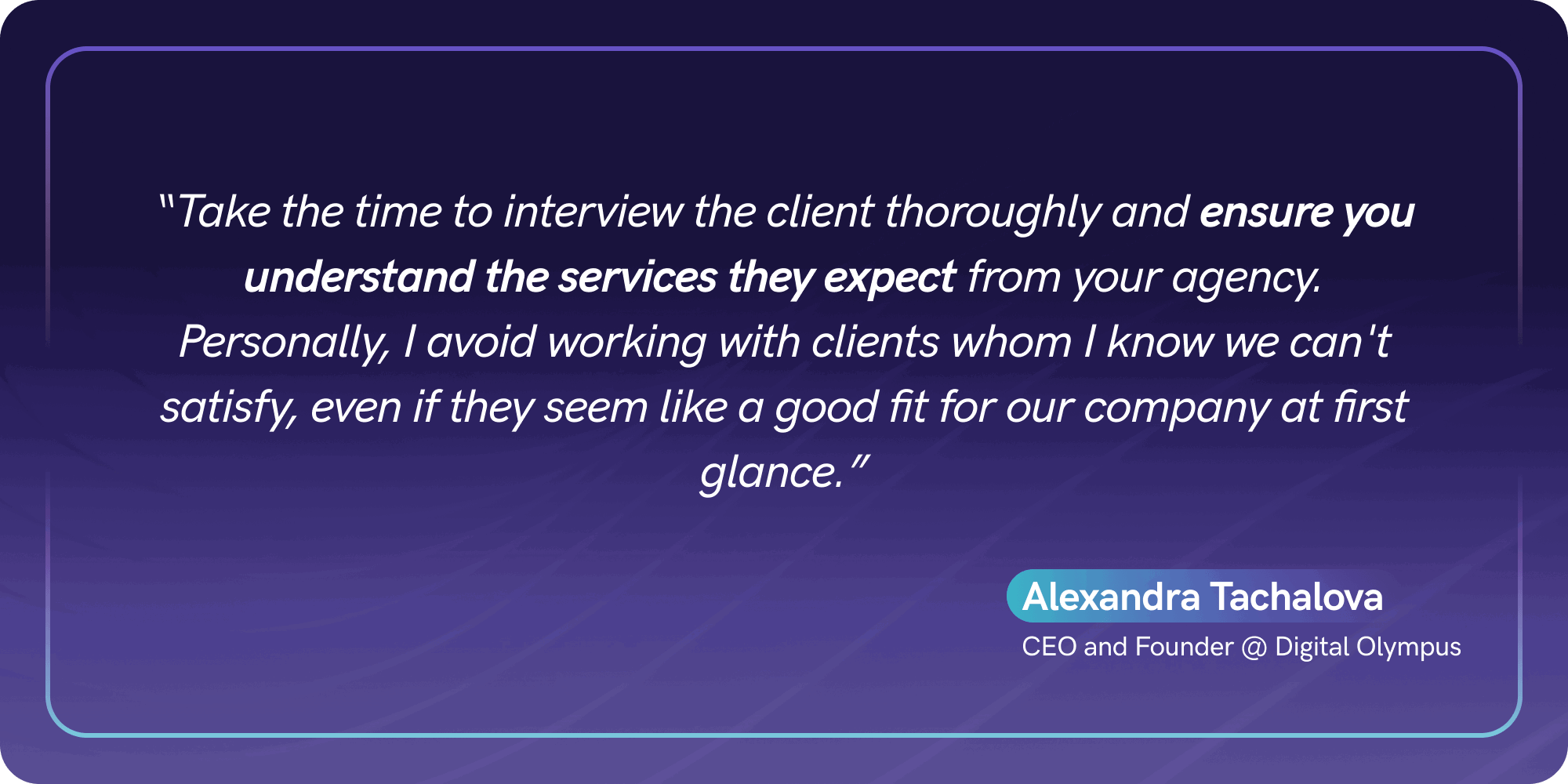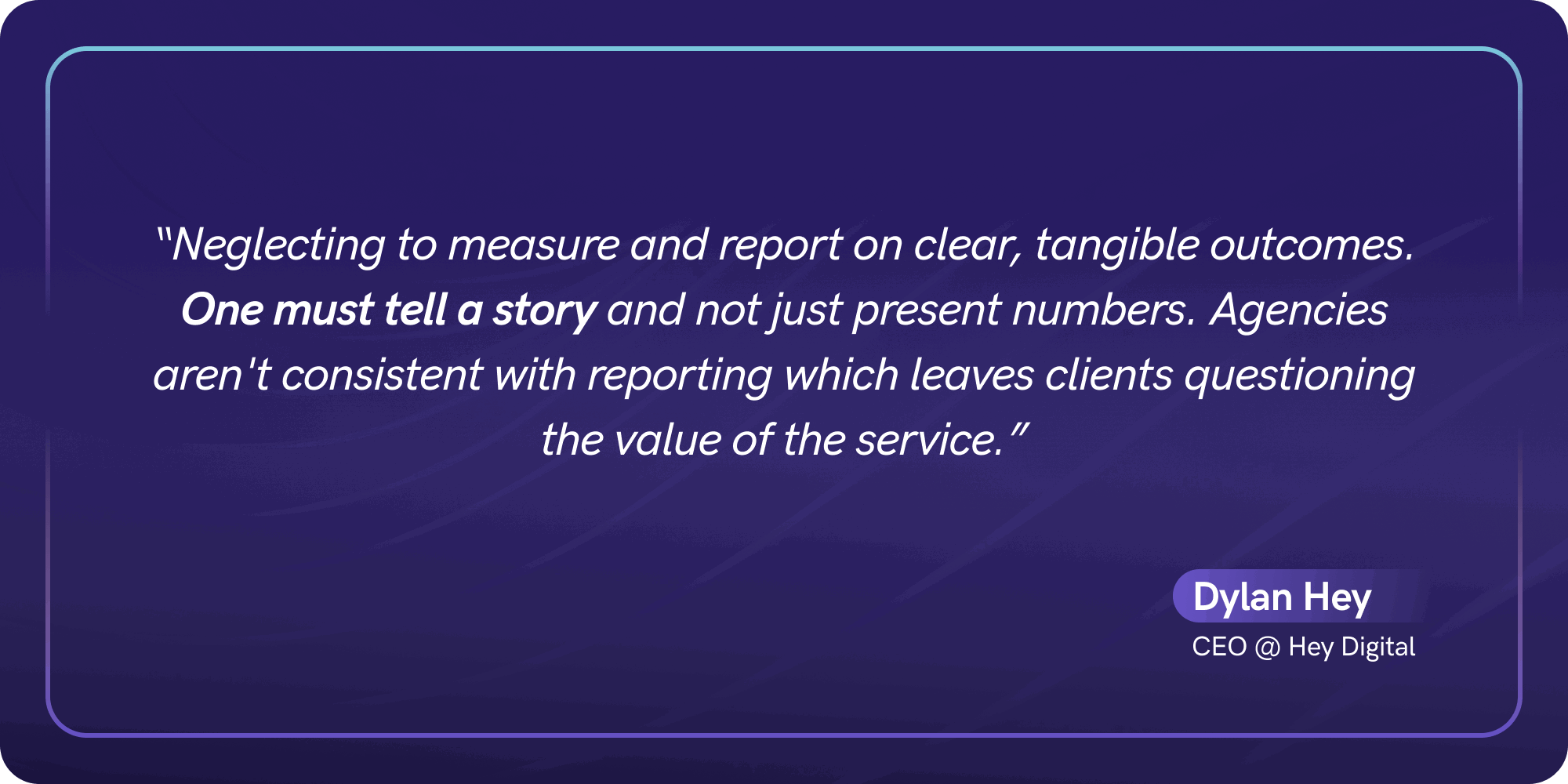Building Trust with Clients: Tips for Marketing Agencies
Retaining clients is just as important as acquiring new ones. However, many marketing agencies struggle to maintain long-term relationships, often finding clients churning despite their best efforts. What causes these rifts? Is it unmet expectations, poor communication, or something deeper?

May 29 2024●5 min read

Understanding the common pitfalls that lead to client loss is the first step toward creating more robust, trust-filled partnerships. In this article, we’ll delve into the most frequent reasons marketing agencies lose clients, from communication breakdowns to inconsistent results. More importantly, we’ll provide expert tips on how to build trust with clients while avoiding the common pitfalls.
Why do clients lose trust in marketing agencies?
Clients lose trust in marketing agencies for several key reasons. Understanding these reasons can help agencies address and prevent trust issues, ultimately fostering stronger client relationships. Here are some common factors that contribute to the erosion of trust:
1. Poor communication
It is often the case that clients either do not have defined and quantified objectives or, alternatively, they pursue conflicting goals. Hence, it is crucial for agencies to set the right expectations at the beginning of the collaboration. They should continuously evaluate these expectations and regularly communicate the results to the client. Such an approach prevents misunderstandings, frustration, and low retention while increasing client satisfaction and fostering long-term partnerships.
Marek Petriľák - Head of Marketing, GALTON Brands
Effective communication is the foundation of a strong client-agency relationship. Here are several ways in which poor communication can weaken client trust:
Not enough transparency: Clients feel left in the dark when agencies don’t provide regular updates or explanations about campaign progress and outcomes. Hidden costs also occur. Unexpected fees and costs erode trust, making clients feel taken advantage of.
Unclear expectations: If the agency does not clearly outline what the client can expect, including timelines and deliverables, misunderstandings and misaligned expectations are likely. On the other hand, making grand promises without a realistic plan to achieve them sets up the agency for failure. When these promises are not met, clients feel misled and lose trust.
Inadequate reporting: Insufficient or unclear reports make it difficult for clients to understand the impact of the agency's work. Reports that lack comprehensive data make it difficult for clients to assess the success of campaigns. This can lead to frustration and doubt about the agency's performance.
To prevent this, use a reporting solution that presents data in a way that is easy for non-marketers to understand.
Irregular updates: Sporadic updates can leave clients feeling uncertain about what is happening with their campaigns. Regular, scheduled communication is crucial for maintaining confidence.
2. Failure to demonstrate value
Failure to drive results, a tough pill to swallow. There may be multiple reasons for this, from a set and forget mentality that erodes performance over time, to unrealistic targets or simply losing sight of the bigger picture of long term goals for short term results in the busy day to day of agency life.
Padhraic Stone - Account Director
Agencies can build trust and foster long-lasting client relationships by delivering tangible outcomes that directly contribute to the client’s business objectives. The inability to demonstrate value can lead to clients losing trust in a marketing agency for several reasons:
Lack of measurable results: Clients expect tangible outcomes from their marketing investment, such as increased leads, sales, or brand awareness. If the agency fails to demonstrate these results through clear metrics and reporting, clients may question the value of the services provided.
That's why it’s important to agree on the critical marketing KPIs from the very start.
Ineffective strategies: Clients may question the efficacy of the agency’s strategies and tactics if they do not see a direct correlation between the agency’s efforts and positive business outcomes.
Failure to address business goals: Clients engage marketing agencies to help achieve specific business objectives. If the agency’s efforts are not closely aligned with these goals, clients may doubt its understanding of their business needs and priorities.
3. Poor understanding of client needs
Agencies should know and understand the clients business objectives, this provides the foundation for SMART (specific, measurable, achievable, relevant, time-bound) goals. Together the client and agency set the most appropriate metrics and KPIs to track a campaigns progress and performance against clear goals. This keeps both parties honest and accountable to a shared outcome.
Padhraic Stone - Account Director
To prevent unmet expectations from eroding client trust, marketing agencies must set realistic, achievable goals and communicate them clearly. Here are several ways in which insufficient understanding of client needs can erode clients trust:
Misalignment of goals: When the agency’s objectives don’t align with the client's business goals, it creates frustration and a sense of wasted effort. When agencies promise more than they can deliver, clients’ expectations are too high. Failing to meet these inflated expectations leads to disappointment and mistrust.
Overpromising and underdelivering: Overpromising can set unrealistic expectations for clients, leading them to expect results or outcomes that are not feasible or achievable within the constraints of the project or campaign. Agencies that promise more than they can deliver set themselves up for failure, leading to client disappointment.
Using generic strategies: Applying one-size-fits-all solutions rather than tailoring strategies to the client's needs can lead to poor performance and frustration. Clients have unique goals, challenges, and market conditions. When agencies use generic strategies, they fail to address these specific needs and make clients feel like just another number rather than a valued partner.

4. Ineffective problem-solving
It’s pivotal that agencies don’t take a ‘one-size-fits-all’ approach to their service. While they can have some type of ‘template’ for how their processes work or a general list of what they can offer, every client should have a personalised approach.
Gareth Bull - Founder of Bulldog Digital Media
By consistently resolving problems promptly and effectively, agencies can build stronger, trust-based relationships with their clients and enhance their reputation for reliability and competence. Ineffective problem-solving can significantly erode clients trust in marketing agencies for several reasons:
Inadequate solutions: Clients expect comprehensive and lasting solutions to their problems. Temporary fixes that only address symptoms rather than root causes can lead to recurring issues, causing clients to lose faith in the agency’s problem-solving capabilities. When solutions fall short of expectations, clients may feel that the agency does not understand their business well enough or is not fully committed to their success.
Slow response to issues: Clients expect timely solutions to their problems. When an agency is slow to respond and resolve issues, clients may perceive the agency as inefficient and lacking the necessary urgency to manage their marketing needs effectively.
Doubt in capabilities: Persistent delays can lead clients to doubt the agency’s ability to handle their accounts. They may start questioning whether the agency has the expertise and resources required to deliver satisfactory results.
5. High turnover of account managers
Physically meet with any new marketing / digital person immediately. A new hire is the biggest risk to losing a client. Not because an agency is doing a bad job but frequently one of the only levers a digital / marketing manager can pull is to change agency. Building a level of rapport as fast as possible helps client to know what the agency people are like and the agency can understand the new hire's thought process.
John Ring - Managing Director @ Tinderpoint
High turnover of account managers can significantly impact clients trust in marketing agencies for several reasons:
Loss of institutional knowledge: Account managers who are familiar with the client’s history, preferences, and objectives provide valuable insights. High turnover leads to losing this knowledge, making it difficult for new managers to serve the client effectively.
Reduced quality of service: New account managers may lack the experience and expertise to understand and address the client’s unique challenges and opportunities, leading to a decline in service quality.
Changing strategies: With each new account manager, there may be a shift in strategic direction or campaign approach. This inconsistency can confuse clients and undermine the effectiveness of marketing efforts.
In addition, changing strategies mid-course may lead to unpredictable results. Clients may experience fluctuations in campaign performance as strategies change with each new account manager, leading to uncertainty and frustration.
How to build trust with your clients?
Building trust with clients as a marketing agency involves several key practices that demonstrate reliability, transparency, expertise, and commitment to client success. By focusing on these key areas, marketing agencies can build trust with clients and maintain strong relationships, ensuring long-term client success and loyalty.
Understand client needs
Take the time to interview the client thoroughly and ensure you understand the services they expect from your agency. Personally, I avoid working with clients whom I know we can't satisfy, even if they seem like a good fit for our company at first glance.
Alexandra Tachalova - CEO and Founder @ Digital Olympus
By focusing on truly understanding and addressing each client's unique needs, agencies can foster long-term, trust-based relationships that drive mutual success.
Conduct deep discovery sessions: Initiate comprehensive discovery sessions to understand the client's business model, goals, challenges, target audience, and competitive landscape. This shows a commitment to grasping the nuances of their business. Use detailed questionnaires to gather specific information about the client’s expectations, past experiences with marketing, and preferred communication style.
Align on strategic goals: Long-term relationships allow for better alignment of goals and strategies. Agencies can work closely with clients to set and adjust long-term objectives, ensuring that both parties work towards common goals. Develop a comprehensive onboarding process that sets clear expectations, timelines, and communication channels. This helps clients understand what to expect and how to engage with your team.
Develop a client success program: Create a dedicated client success program that focuses on building and maintaining long-term relationships. This could include regular check-ins, performance reviews, and tailored support initiatives.
Design campaigns that resonate with the client’s brand identity and target audience, demonstrating a deep understanding of their market.
Demonstrate expertise
Ultimately, there is a promise of trust and an exchange of trust in any client, agency relationship. Agencies can demonstrate their value by causing far more revenue than they cost, showing early signs of success to garner confidence and building on trust through performance in achieving the client’s goals.
Daniel Carey - Owner @ Like Communications
By showcasing proven results, providing educational content, staying current with industry trends, demonstrating analytical skills, and solving problems efficiently, marketing agencies can not only establish credibility but also foster strong, long-term client relationships.
Deliver consistent performance and results: Deliver excellence in every aspect of your work, from strategy development and creative execution to campaign performance and results analysis. Explain the step-by-step process your agency followed to achieve success. This transparency helps potential clients understand your methodology and trust your approach.
Regularly monitor and optimize campaign performance: Identify areas for improvement and adapt strategies as needed to ensure consistent delivery of results that meet or exceed client expectations. Use graphs, charts, and screenshots to visualize the results. Visual proof can be more persuasive than text alone.
Showcase case studies and testimonials: Create relevant case studies across different industries and marketing disciplines (e.g., SEO, PPC, social media). This demonstrates your versatility and ability to handle diverse client needs.
Webinars and workshops: Host webinars, workshops, and seminars on relevant marketing topics. Offer free, valuable knowledge to demonstrate your agency’s commitment to education and expertise.

Solve problems proactively
The biggest mistake in our industry is made by agencies that forget their role as proactive contributors. Agencies that strictly follow the client's brief will ultimately disappoint, unlike those that push boundaries and offer ideas beyond the initial scope.
Pierre-Baptiste Borges - Head of Business Development @ Odace
A proactive approach shows clients that the agency is dedicated to their success and capable of managing challenges efficiently, thereby fostering a trustworthy and reliable partnership.
Anticipate issues: Proactively identifying potential issues before they become significant problems showcases the agency’s deep understanding of marketing and the client’s specific needs. This foresight reflects a high level of expertise and competence.
Suggest preemptive measures: Implementing preemptive measures to mitigate risks demonstrates that the agency is not only capable of addressing problems but is also skilled at preventing them. This capability builds client confidence in the agency’s expertise.
Apply customized solutions: By understanding the client’s business, industry, target audience, and specific challenges, the agency can develop customized marketing strategies. Personalized solutions demonstrate that the agency is not just using a generic approach but is focused on the client’s unique situation.
Maintain composure and professionalism: Maintaining composure under pressure shows clients that the agency can handle stressful situations without compromising the quality of their work. This reliability is a cornerstone of trust.
Leverage technology and tools
By automating our data collection and reporting, we have not only made our own operations more efficient, but above all improved our customers' access to information. They can now benefit in real time from deeper insights presented in a clear and user-friendly way. We can now together make faster and even better decisions!
Andreas Sandgren - CEO @ Market Solutions
Using industry-leading technology and tools helps marketing agencies build trust with clients by enhancing transparency, improving efficiency and accuracy, demonstrating advanced capabilities, providing actionable insights, ensuring accountability and trackability, enhancing security and data protection, and facilitating customized solutions.
Use real-time reporting: Tools like Google Analytics, HubSpot, and various project management platforms provide real-time data and progress reports. This transparency keeps clients informed about the status of their campaigns and projects, reinforcing trust.
However, managing and reporting KPIs from different marketing platforms takes time, both on the agency’s side to collect data and create reports, and on the client’s side to interpret it.
That’s why you should always:
Provide cross-channel insights: Performance monitoring tools that integrate data from multiple sources (e.g., CRM systems, social media, and website analytics) provide a comprehensive view of campaign performance. Accurate and integrated data helps agencies make informed decisions and deliver precise reports to clients.
Send consistent updates: Automated reporting tools can send regular updates and insights to clients, ensuring they are always aware of their campaign performance and any adjustments made.
Offer shared workspaces: Creating shared workspaces where clients can access project documents, calendars, and task lists enhances transparency and collaboration, making clients feel more involved and valued.
Bottom line
As we’ve explored, marketing agencies often lose clients due to poor communication, unmet expectations, generic approach, inconsistent results, and other critical missteps.
However, the journey doesn’t end here. By focusing on building trust through understanding client needs, proactive problem-solving, and leveraging cutting-edge technology, agencies can transform potential pitfalls into opportunities for growth and loyalty.
The key to building trust with clients lies in listening, adapting, and innovating. Marketing agencies that prioritize transparency, demonstrate value, and invest in understanding their client’s unique needs will not only retain their accounts but also build enduring relationships founded on trust and mutual success.
Find more client retention strategies, expert guides, and resources on our Agency Hub page.

WRITTEN BY
Nikola GemesNikola is a content marketer at Whatagraph with extensive writing experience in SaaS and tech niches. With a background in content management apps and composable architectures, it's his job to educate readers about the latest developments in the world of marketing data, data warehousing, headless architectures, and federated content platforms.